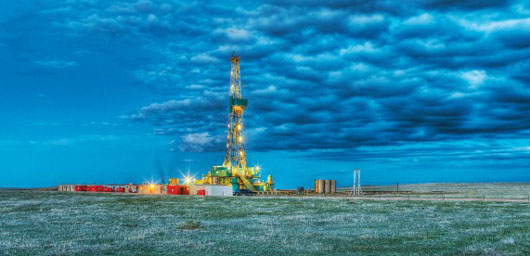by WorldTribune Staff, November 13, 2018
House Democrats are expected to take aim at the fracking industry that has been a major boon to the U.S. economy and despite its excellent safety record, a columnist noted.
“Energy production on public lands in the American West is likely to come under increased scrutiny” when Democrats assume control of the House in January, Mark J. Perry, professor of economics and finance at the University of Michigan’s Flint campus, wrote for the Washington Examiner on Nov. 12.

The American West “is doing surprisingly well, and its future prospects seem even brighter – if oil and gas resources are safely extracted and not kept in the ground at the demand of environmentalists who want to see the oil and gas leasing program killed,” Perry wrote.
A group of Democrats joining the House have backed a so-called “Green New Deal” platform which aims to rapidly shift the U.S. away from fossil fuels.
“It’s hard to see what anyone would gain from slowing down an oil and gas leasing program that’s become a growth engine for the nation’s economy and is having a huge positive impact on job creation,” Perry wrote.
Democrats have also vowed to launch a series of investigations of the Trump administration’s policies, likely including the president’s moves to ease restrictions on issuing leases for drilling on public lands.
Perry noted that Democrats will likely target fracking even though “from an environmental point of view, the increased use of natural gas has driven down U.S. emissions of carbon dioxide from the electric power sector to a 20-year low by substituting for carbon-rich coal.”
The Western states “are blessed with substantial reserves of natural gas, and it would be nothing short of folly not to extract those resources,” Perry wrote.
In the 2018 midterms, voters in two Western states – Washington and Colorado – rejected ballot measures on climate change.
In Washington, Initiative 1631, which would have imposed a $15 per metric ton carbon tax to pay for solar- and wind-power plants and energy-efficiency retrofits, failed by double digits. If it had passed, Initiative 1631 would have been the nation’s first carbon tax.
In Colorado, Proposition 112, which would have put about 85 percent of non-federal land in the state off limits to oil and gas drilling, was overwhelmingly defeated.
The concerns of environmentalists “always need to be balanced against economic factors and the excellent safety record going back decades for fracking for oil and natural gas,” Perry wrote. “Coloradoans recognized this on Election Day when they voted to reject an anti-fracking proposal.”
Perry continued: “If we can’t take advantage of our natural gas resources, we must rely on imports. Consider that as recently as 2007 the U.S. was spending billions of dollars a year to buy liquefied natural gas from foreign countries. Now the U.S. is significantly more energy secure, and we’re able to export liquefied natural gas to buyers around the world, thanks to the growth in gas production that’s been made possible by the shale revolution and made-in-the-USA extraction technologies such as fracking and directional drilling.”
“It’s important to understand that developing our energy resources and protecting the environment are not mutually exclusive,” Perry wrote. “Technological innovations have made it possible to drill for oil and gas in new parts of the country, funneling billions of dollars and thousands of jobs into local economies.”
Subscribe to Geostrategy-Direct __________ Support Free Press Foundation
